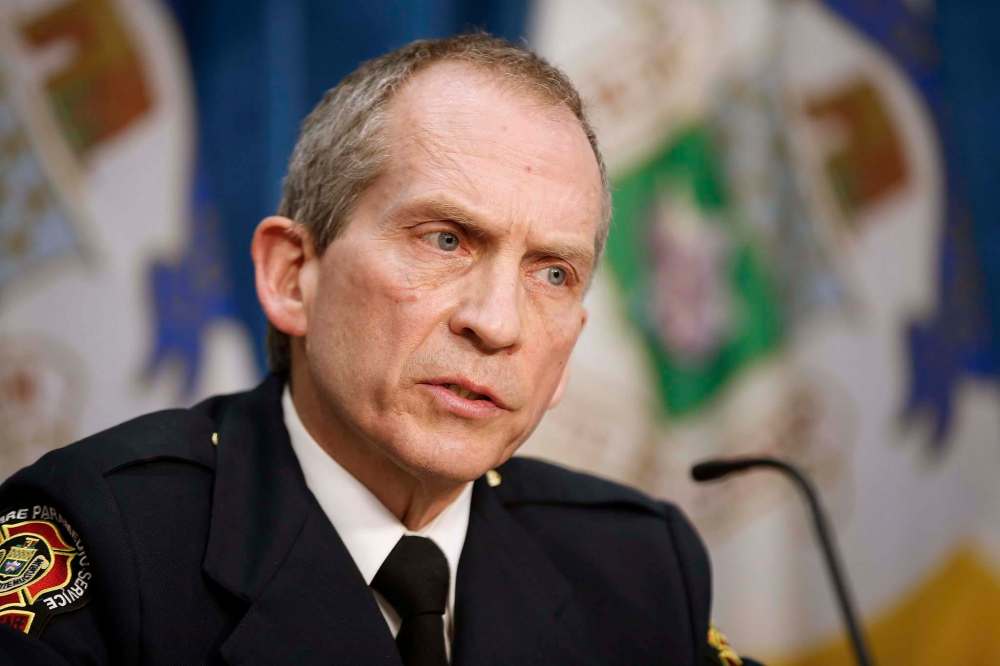Transparent action needed to repair WFPS
Read this article for free:
or
Already have an account? Log in here »
To continue reading, please subscribe:
Monthly Digital Subscription
$0 for the first 4 weeks*
- Enjoy unlimited reading on winnipegfreepress.com
- Read the E-Edition, our digital replica newspaper
- Access News Break, our award-winning app
- Play interactive puzzles
*No charge for 4 weeks then price increases to the regular rate of $19.00 plus GST every four weeks. Offer available to new and qualified returning subscribers only. Cancel any time.
Monthly Digital Subscription
$4.75/week*
- Enjoy unlimited reading on winnipegfreepress.com
- Read the E-Edition, our digital replica newspaper
- Access News Break, our award-winning app
- Play interactive puzzles
*Billed as $19 plus GST every four weeks. Cancel any time.
To continue reading, please subscribe:
Add Free Press access to your Brandon Sun subscription for only an additional
$1 for the first 4 weeks*
*Your next subscription payment will increase by $1.00 and you will be charged $16.99 plus GST for four weeks. After four weeks, your payment will increase to $23.99 plus GST every four weeks.
Read unlimited articles for free today:
or
Already have an account? Log in here »
Hey there, time traveller!
This article was published 18/02/2021 (1755 days ago), so information in it may no longer be current.
When early 20th-century American jurist Louis Brandeis suggested sunlight — meaning full public exposure — is the best of disinfectants, he could easily have been referring to the current plight of the Winnipeg Fire Paramedic Service, and the need for a fully transparent examination of what many have described as deeply ingrained systemic dysfunction that exists therein.
By now, the reason for the recent focus on racism within the WFPS is well known, thanks to a third-party report on the incident. On Oct. 7, firefighters and paramedics were dispatched to the North End to attend to an Indigenous woman who had stabbed herself in the throat. A paramedic, who happens to be a person of colour, later accused two of his firefighter colleagues of failing to provide medical care to the patient and delaying her transport to hospital.
Discord in fire-paramedic service burning out of control

Posted:
City's long-smouldering fire-paramedic services' marriage of convenience erupts in signs of irreconcilable differences that could put lives in danger Review backing paramedic's allegations of racism in the WFPS threatens to ignite decades of uneasy co-existence under the same roof
The incident prompted a Free Press investigation, published last Saturday, in which nine WFPS members, from both the firefighting and paramedic disciplines, revealed that racist behaviour is among the problems that have festered since the amalgamation of the two services 24 years ago.
As they described a toxic relationship between the two groups, some complaints seemed petty. Some colleagues apparently shirk the shared housekeeping responsibilities around the fire halls, or fail to contribute to a “kitty” that pays for groceries.
Other complaints are more institutionally significant. Although fire calls have decreased by 46 per cent over the past 10 years and calls for medical help have soared, the fleets of fire trucks and ambulances have not been reconfigured to reflect changing needs. According to insiders interviewed, fire trucks remain the priority because the union representing firefighters is inordinately powerful.
Perhaps most immediately concerning, however, are the reports that Winnipeg fire halls are dominated by a “frat house” atmosphere in which macho behaviour and racism are rampant. It raises the grim possibility that in a multicultural city like Winnipeg, with a particularly large Indigenous population, some responders arrive at emergency calls equipped with racist attitudes.
It’s important to note not all members of the WFPS should be perceived as racist. However, the paramedic who initially reported the firefighters’ delay in assisting with treatment of the Indigenous woman had earlier filed complaints of other racist conduct within the WFPS — a necessary and commendable action that undoubtedly didn’t win friends among his colleagues and apparently contributed to the friction during the incident in question.

The willingness of people to speak out will be crucial to ongoing efforts to confront racism within the WFPS. Chief John Lane will eventually be pressured to make changes, and firefighters’ union boss Alex Forrest should get off the fence and, as challenged by Mayor Brian Bowman, answer directly whether he believes systemic racism exists within the WFPS and the United Fire Fighters of Winnipeg.
But ultimately, identifying and addressing the problem of systemic racism will depend on the response of the rank-and-file who work within the fire halls in which the culture has been allowed to persist.
Their frank participation is needed in a workplace-culture survey that is planned by third-party consultants hired by the WFPS. Full results of that survey should be made public, because the WFPS services are publicly funded and its members deal directly with the public.
Also, WFPS members who observe racist behaviour can and should report it under the protection of whistleblower legislation. In 2018, Manitoba became the first Canadian jurisdiction to include municipal governments under its whistleblower protection legislation.
Paramedics and firefighters deliver an essential service that saves lives. What’s also essential is rooting out racism and helping to restore public confidence in the integrity of the WFPS.









